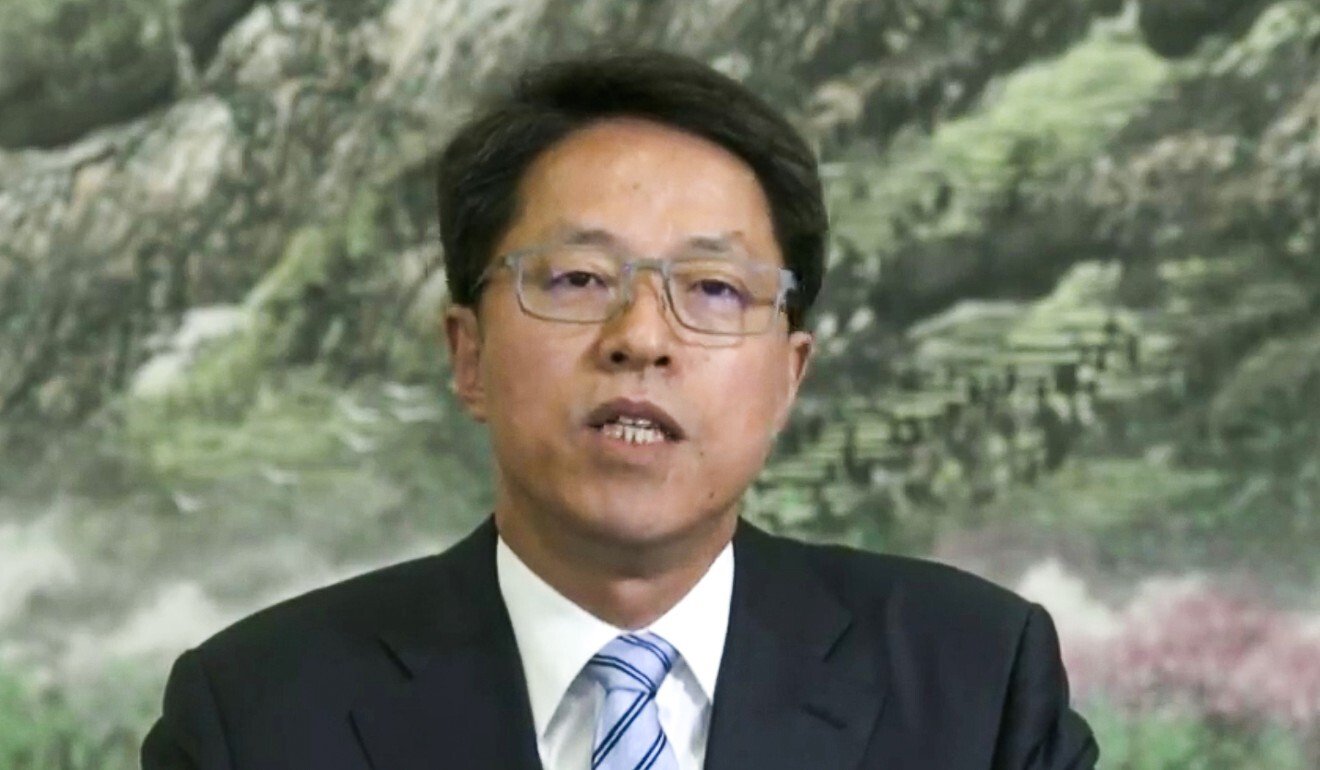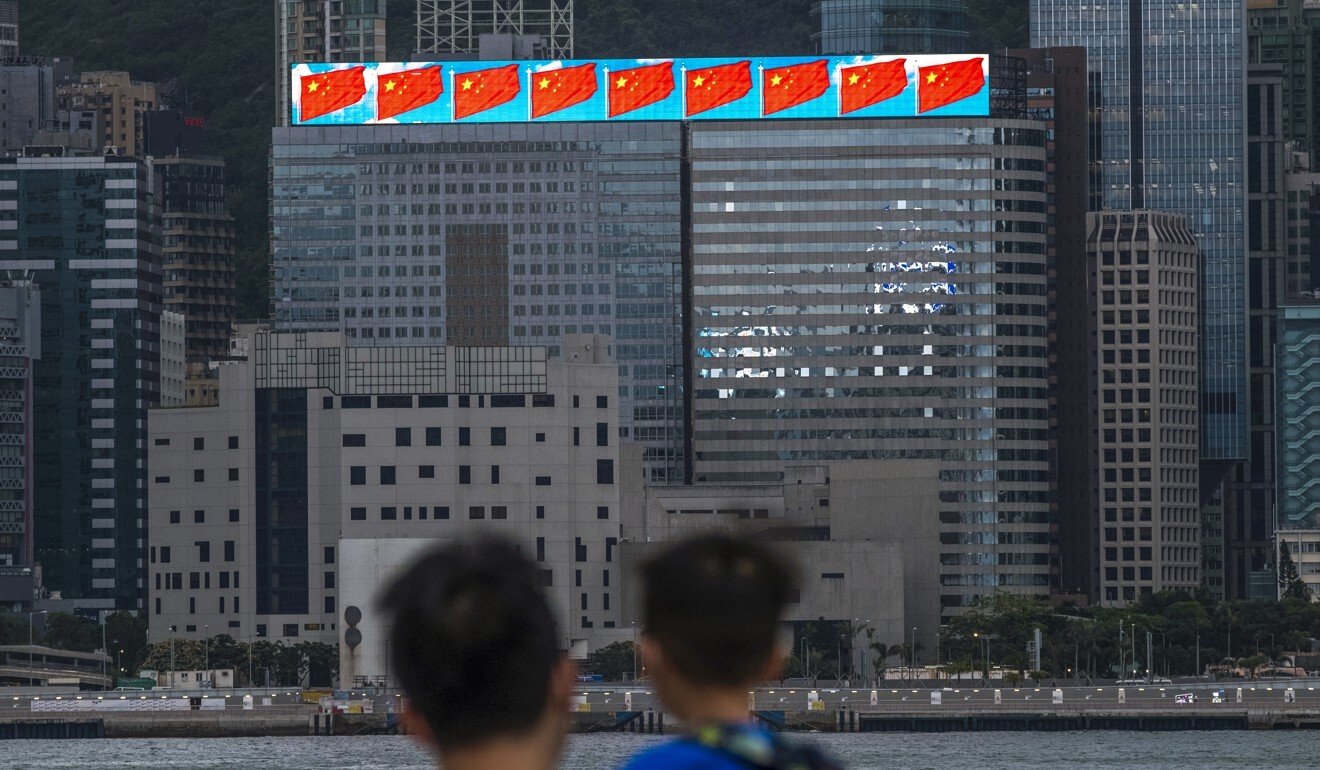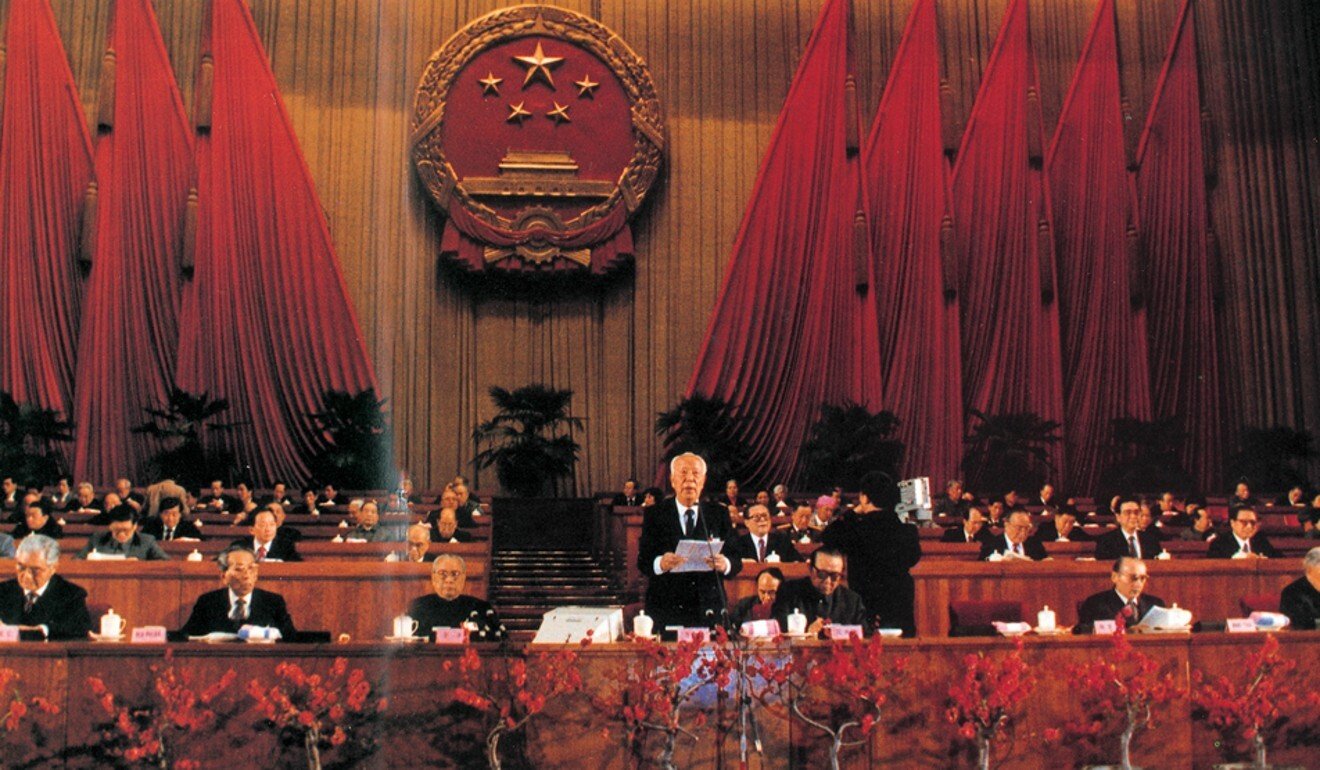National security law for Hong Kong to boost ‘one country, two systems’ and ensure freedoms beyond 2047: top official in most candid comments yet from Beijing
- HKMAO deputy chief Zhang Xiaoming’s webinar marked the most detailed explanation so far from a high-ranking Beijing official on controversial law
- In a rare admission, Zhang also identified city’s problems as political rather than economic

Zhang Xiaoming, deputy director of Beijing’s Hong Kong and Macau Affairs Office, says even as Deng Xiaoping came up with ‘one country, two systems’, national sovereignty was at the core of his consideration. Photo: May Tse
 The new national security law for Hong Kong is meant to strengthen, not undermine, the “one country, two systems” principle and will ensure the freedoms granted to the city can be extended beyond 2047, a top Beijing official has said.
The new national security law for Hong Kong is meant to strengthen, not undermine, the “one country, two systems” principle and will ensure the freedoms granted to the city can be extended beyond 2047, a top Beijing official has said.
Contrary to alarmist warnings of the opposition and foreign powers eager to demonise the central government, the new legislation would target “very few” people committing the four crimes of secession, subversion, terrorism and foreign intervention, said Zhang Xiaoming, deputy director of the Hong Kong and Macau Affairs Office (HKMAO).
The vast majority of Hong Kong people, meanwhile, would have peace and order restored in the city, and their rights and freedoms better protected from negative elements, such as those behind violent protests, those demanding independence and others who colluded with foreign powers.

Zhang Xiaoming, deputy director of Beijing’s Hong Kong and Macau Affairs Office, spoke on Monday at a three-hour webinar marking the 30th anniversary of the city’s Basic Law. Photo: RTHK
In dealing with such “destructive forces”, Zhang said, the new law was enlarging the space for the one country, two systems principle and this in turn would ensure the country’s leadership would support it being continued beyond 2047, when the model was due to expire.
“Many people in Hong Kong have been thinking about the future of one country, two systems after 2047. We also need to think of this: what kind of record is Hong Kong going to bring, to win a new mandate from the National People’s Congress (NPC), and the Chinese people that it represents at that time,” said Zhang, one of seven deputy directors of the State Council-level office and a member of the leading group on the city’s affairs.
Zhang said the stronger the commitment to national security, the more room there would be for the one country, two systems principle.
His comments, delivered at a webinar accessible to all Hongkongers rather than the usual select circle of pro-establishment politicians, marked the most candid and comprehensive explanation yet from a high-ranking official on the need for the controversial national security legislation.
“For the majority of citizens, the legislation will give them more protection,” he said.
“They can be free from the fear of violence. They can ride the trains and go shopping freely. They can speak the truth on the street without fear of being attacked.
“In particular, they no longer have to worry about young people being brainwashed into breaking the law on impulse and leaving lifelong criminal records. There will be hope in Hong Kong’s future.”
While pro-establishment politicians welcomed the breadth and depth of Zhang’s speech, opposition lawmakers said he was wrong to accuse protesters when it was the city government’s poor leadership that was to blame for the current political woes.
At the three-hour webinar, Basic Law Committee vice-chairman Zhang Yong also gave a lecture, spelling out in the clearest terms the definition of national security, highlighting that it also included financial, biological and nuclear security.
He stressed that even though Beijing had decided to impose the new law by having the NPC Standing Committee pass it, Hong Kong still had to enact Article 23 of the Basic Law on national security. This was a duty and a legal obligation not for delegation, he said.
In his 40-minute speech, Zhang Xiaoming also identified Hong Kong’s problems as being “political” in nature rather than economic, a rare admission by a top Chinese official.
“Hong Kong’s major problem is not economic, housing, employment … or young people’s mobility,” he said. “It is a political problem, and a major manifestation is the fundamental question of what kind of Hong Kong do we want to build.”
Zhang said while Beijing wanted to build a city with one country, two systems, the opposition camp and forces behind them had been trying to turn Hong Kong into an independent or semi-independent political entity.
“The opposition camp’s radical separatists have been mistaking the central government’s restraint and forbearance for weakness and timidity,” he said. “They have gone too far.”
His speech, broadcast on Facebook and the Hong Kong government’s website, highlighted Beijing’s redoubling of its efforts to communicate directly with Hong Kong people, after China’s legislature, the NPC, approved a resolution on May 28 authorising its standing committee to tailor-make a national security law for the city.

A Beijing-imposed security law for Hong Kong has some residents fearing a reduction in the city’s long-standing freedoms. Photo: Sun Yeung
The webinar marked the 30th anniversary of the city’s mini-constitution, the
.
Under Beijing’s proposal, the Hong Kong government will have to set up new institutions to safeguard national security and also allow mainland agencies to operate in the city “when needed”, all moves widely criticised by opposition politicians as means to suppress dissent.
But Zhang Xiaoming made it clear that such agencies would abide by local laws, and fully respect Hong Kong’s independent judicial power.
“[The agency] will act according to modern principles of the rule of law,” he said.
“When national security agencies conduct investigations on the mainland, they must strictly abide by the law and are restricted by stringent principles. How can they become unrestrained in Hong Kong?”
Apart from explaining the legal scope of the new law, Zhang also sought to paint a historical context to the legislation. He said Beijing’s plan for the new law was in line with late leader Deng Xiaoping’s belief that the one country, two systems principle allowed for the central government to step in when necessary.
Citing Deng at length, Zhang said national sovereignty was at the core of Deng’s concerns, when the late leader came up with the governing policy.
“In 1987, as Deng met delegates from Hong Kong, he said while the central government would not interfere with Hong Kong’s affairs … it must take action when chaos emerged,” the official said.
Deng said Beijing must interfere when “destructive forces” emerge, Zhang added, pointing out that current President Xi Jinping had emphasised that the implementation of one country, two systems must not be “distorted”.
Zhang then went on to explain why the central government must act on Hong Kong’s lack of national security legislation, saying that from 2012, separatist acts had become more visible in Hong Kong.
“When student bodies called for ‘self-determination of the Hong Kong nation’, people said they have the academic freedom to do so,” he recalled.
“But more and more people realise that ‘Hong Kong independence’ is a political virus … Once in force, this law will be like installing antivirus software into Hong Kong, with one country, two systems running more safely, smoothly and enduringly.”

The National People’s Congress in Beijing passed Hong Kong’s Basic Law on April 4, 1990. Photo: Xinhua
Zhang argued that Beijing’s move could be seen as a turning point for Hong Kong to end the chaos.
“This [legislation is a] decisive measure taken by the central government … to ensure the long-term and stable implementation of one country, two systems,” he said.
Zhang also directed blunt ripostes at vocal critics of the Chinese government but without naming them. He said those who suggested Hong Kong could be a “Trojan horse” to introduce changes in China or further US interests were actually “anti-communist and anti-China forces … trying to seize power in Hong Kong”.
But Zhang did name one American official, as he cited how US Secretary of State Mike Pompeo had revealed that the United States once hoped that a “free and prosperous Hong Kong would provide a model for authoritarian China”. This was “utter delusion”, Zhang said.
The two top officials’ speeches were followed by a dialogue between the Basic Law Committee’s vice-chairwoman Maria Tam Wai-chu, her predecessor Elsie Leung Oi-sie, and current member Albert Chen Hung-yee.
On Zhang’s promise that mainland agencies would respect Hong Kong’s independent judicial power, Chen, a University of Hong Kong law professor, said it showed that it would be likely for national security cases to be tried in Hong Kong courts and by local judges.
“I believe the central government would clearly define what constitutes an offence, so that people will know clearly how to avoid breaching the new law,” Chen said.
In Zhang’s speech, he also pointed out the similarities between the judicial systems in Hong Kong and the mainland, saying both insisted on principles that included due process, presumption of innocence and judicial transparency.
Elsie Leung said those were important common law principles adopted by the mainland since its judicial reforms in recent years.
“When [the new law] is enacted, I believe there won’t be huge clashes due to the differences between the two legal systems,” she said.
Committee vice-chairwoman Maria Tam said Zhang made it clear the imposition of the law tailor-made for Hong Kong was aimed at safeguarding national security of a country with a population of 1.4 billion.
But speaking separately, Civic Party leader Alvin Yeung Ngok-kiu said he was disappointed that Beijing still misjudged root causes of the political turmoil in Hong Kong.
“Beijing only sees resistance as acts of secession instead of reflecting on what went wrong in the local governance,” he said.
As part of the release of its new book, Rebel City: Hong Kong’s Year of Water and Fire, SCMP will be following up with a webinar on June 9. Titled “
”, the event will feature our award-winning journalists behind the book as they share their perspectives, reflections and stories about the city’s most devastating political and social crisis since its return to Chinese rule. The date also marks the one-year anniversary of the mass protests that were first sparked by the government’s now-withdrawn extradition bill. What are the lessons to be drawn and how can the city move forward? “
” on June 9 for a fascinating panel discussion.
This article appeared in the South China Morning Post print edition as: Security law ‘ensures freedoms beyond 2047’



No comments:
Post a Comment
Note: only a member of this blog may post a comment.